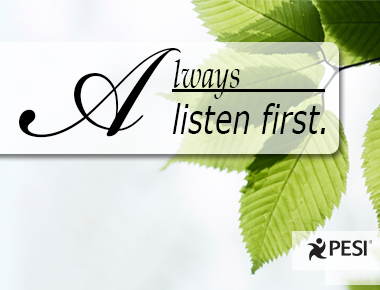Can You Hear Me Now: When to stop fixing and just listen

When a client comes to you in emotional distress and you sense that childhood wounds are the cause, your instinct is to spring into action. I've spent my career working as a marriage and family therapist, so I understand this instinct. We want to stitch them up and slap on a new metaphorical bandage.
You Can't Fix Them
We think, understandably, that because of years of education and training, we can fix them. We can't. At least not yet.
Here's why:
If something happened to your client as a child, and they've been carrying the experience around silently for decades, the act of putting voice to their story and having someone listen and really, truly hear them, can feel groundbreaking to them. In the beginning of your journey with them into their past, that's all they need from you.
Don't Offer Solutions
As your client opens up to you about their past, one of the worst things you can do is to try to offer solutions too soon. While you may have had a dozen clients who experienced similar trauma, and you have a dozen ways to heal their wounds, if you immediately jump to fix-it mode, the message you send your client is, "Your experience isn't unique."
Your client doesn't want to feel like they are one of many with similar stories, and when you rush in with solutions, they may feel ashamed they couldn't solve it themselves. Instead, when you sit with your client in silence and hear them tell their story鈥攊n their way, at their pace鈥攜ou are able to offer them the validation they have wanted their whole life and haven't received.
Andrea Brandt, Ph.D., MFT, brings over 30 years of clinical experience to her work as a renowned psychotherapist, speaker, and author. A pioneer in the field of treating anger issues, she also works with a full range of emotional concerns: anxiety, aggression, aging, workplace, women鈥檚 issues, and relationship dynamics. Her wisdom, warmth, and humor have made her a frequently featured media expert, appearing on numerous television and radio shows and interviewed in the Los Angeles Times, ehow.com, and Parenting Magazine. She is also the author of Mindful Anger: A Pathway to Emotional Healing. For additional information, visit
You Can't Fix Them
We think, understandably, that because of years of education and training, we can fix them. We can't. At least not yet.
Here's why:
If something happened to your client as a child, and they've been carrying the experience around silently for decades, the act of putting voice to their story and having someone listen and really, truly hear them, can feel groundbreaking to them. In the beginning of your journey with them into their past, that's all they need from you.
Don't Offer Solutions
As your client opens up to you about their past, one of the worst things you can do is to try to offer solutions too soon. While you may have had a dozen clients who experienced similar trauma, and you have a dozen ways to heal their wounds, if you immediately jump to fix-it mode, the message you send your client is, "Your experience isn't unique."
Your client doesn't want to feel like they are one of many with similar stories, and when you rush in with solutions, they may feel ashamed they couldn't solve it themselves. Instead, when you sit with your client in silence and hear them tell their story鈥攊n their way, at their pace鈥攜ou are able to offer them the validation they have wanted their whole life and haven't received.
Your client needs to know that their experience is as unique and as important to you as it is to them.Being heard brings the realization that we are not alone, that people care about our feelings. As a family therapist, I've seen how important silent listening is. When you listen, you let your client know that they are not alone and never have to suffer in silence again. The end goal is to heal the wounds, but the first step is to just let the wound breath.
Andrea Brandt, Ph.D., MFT, brings over 30 years of clinical experience to her work as a renowned psychotherapist, speaker, and author. A pioneer in the field of treating anger issues, she also works with a full range of emotional concerns: anxiety, aggression, aging, workplace, women鈥檚 issues, and relationship dynamics. Her wisdom, warmth, and humor have made her a frequently featured media expert, appearing on numerous television and radio shows and interviewed in the Los Angeles Times, ehow.com, and Parenting Magazine. She is also the author of Mindful Anger: A Pathway to Emotional Healing. For additional information, visit
 |
Topic: Clinical Psychology and Psychiatry


